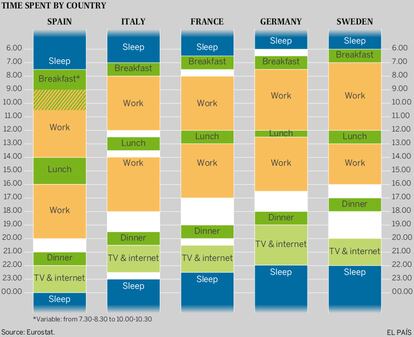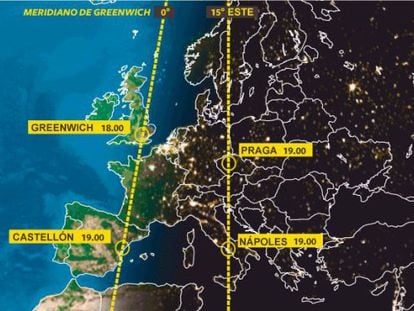The chart that proves that Spanish schedules are downright weird
The country does not observe its natural time zone, leading to a two-hour lag in just about everything

While Spaniards are still watching the season’s top TV series, El Ministerio del Tiempo (The Ministry of Time), which starts at 10.15pm, Germans are already tucked up in bed.
So are the Italians, who had dinner between 7.30 and 8pm.
When tourists came to Spain, they would be less amazed at our chaotic lifestyle
Although it might sound anecdotal, the average two-hour lag in Spain compared with the rest of Europe affects all aspects of daily life, from work and family, to leisure time.
This is because Spain is on Central European time, rather than on Western European Time as it geographically falls into.
But a growing chorus of voices is asking to correct the country’s time zone once and for all and stop being an anomaly in Europe.
Spain vs. Europe
“When you go live abroad or are in touch with Spaniards who’ve moved away, you realize that we are the Ugly Duckling in our immediate environment,” says José María Fernández-Crehuet, an economics professor at the Madrid Distance University. “Spain is a very peculiar country in the schedules that it keeps.”
His research work La conciliación de la vida profesional, familiar y personal. España en el contexto europeo (or, Reconciling work, family and personal life. Spain in the European context) concludes that Spaniards work longer hours that other Europeans, yet have worse results to show for it, chiefly in the form of lower productivity.
Spanish schedules also make it difficult to reconcile work and family life.
From bad to worse
Fernández-Crehuet analyzed 27 indicators representing broad aspects that affect work-family balance, and compared them with Eurostat data. After charting the average Spaniard’s day, he realized that “Spaniards start the day very badly.”
“We get up tired and cranky because we went to bed really late. And we don’t have breakfast at home, or if we do, it’s fast and insufficient,” he says.
And it’s all downhill from there.

“We need to stop at mid-morning to grab a bite, and that hour that we waste could be better spent going home an hour earlier at the end of the working day,” he adds. “Similarly, instead of having late lunches, we could easily eat at 1pm.”
If to this we add the fact that the Spanish workday is often cut in half by a two-hour lunch break, “the number of hours spent at the workplace gets even longer.” This means everything has to take place later, from dinner to TV prime time programming.
But why?
“We didn’t always have these schedules,” notes Sara Berbel, a psychologist and director of the consultancy Empowerment Hub. “There are references in the novels of [turn-of-the-century writer Emilia] Pardo Bazán showing that earlier, in Spain – especially in the countryside, where there was no industrialization yet – people ate lunch at 12.30pm or 1pm.”
By coordinating our work hours with the rest of European workers, our commercial relations would improve
José María Fernández-Crehuet, economist
And it’s not a question of climate, since Greece, Italy and Portugal have similar environments yet do not keep the same late times.
The real reason dates back to the end of World War II and the fact that Spain at the time was under the Franco dictatorship.
“During the period of industrialization, European countries had adopted extremely long and rigid working hours, but after the war everyone saw that this was no longer feasible and had to be changed,” says Berbel.
“But our country entered into a dictatorship and the modernizing process came to a halt. That is why we still have the least flexible schedules in all of Europe,” she adds.

Berbel also notes that the late eating patterns, another quirk of the Spanish system, also originated around the same time.
“Men, who were then the main providers, were forced to hold several jobs to make ends meet. A bank clerk would be at the branch office from 9am to 3pm, then work from 4pm to 8pm pushing papers at a gestoría. The family did not have dinner until he came home.”
This habit of the 9pm dinner has survived until the present.
The sun also rises...late
“Mainland Spain is currently one hour ahead (GMT+1) of what it should be (GMT+0) given its geographical location,” says Fernández-Crehuet. “Because the official time does not coincide with the solar time, in most of Spain the sun rises and sets later than in other European countries around us.”
Sign up to our newsletter!
The EL PAÍS English Edition is launching a weekly newsletter. Sign up today to receive a selection of our best stories in your inbox every Saturday morning. For full details about how to subscribe, click here.
This is because Franco decided, back in 1940, to adapt to Nazi Germany’s own time zone. The normal thing would be for mainland Spain to be on the same time as its own Canary Islands, or as Portugal and Britain.
Some experts feel that it would at least help if Spain did not switch to daylight saving time in the spring, as the country did last weekend.
“It would bring our official time closer to the solar time, and that would make it easier to change some of our habits to improve our quality of life,” says Fernández-Crehuet. Sara Berbel agrees, but notes that it would not be enough to simply adapt our watches.
Our country entered into a dictatorship and the modernizing process came to a halt. That is why we still have the least flexible schedules in all of Europe
Sara Berbel, psychologist
Instead, there would have to be some kind of grand alliance of Spain’s social sectors to implement all the necessary changes, from work hours and school schedules, to TV programming.
Change would also have to take into account the needs of each sector: “This is what the field of economics calls game theory: if I am the only one to make changes, I end up losing. But if everyone changes at the same time, everyone wins.”
Still at the office
What Spaniards appreciate the most about daylight saving time is the extra sunlight at the end of the day. But experts note that even this may not be quite as profitable as we thought.

“Around 46% of Spaniards are still at work at 6pm, and 10% are still there at 9pm,” says Berbel. “So they are not having a good time, they are working.”
“Surveys show that two-thirds of Spaniards support the longer evening daylight so they can do outdoor activities, but this does not necessarily mean that they are going to get out of work any earlier.”
If Spain adapted to its natural time zone, it wouldn’t just be people’s lives that improved. Fernández-Crehuet says exports would do better too, “because by coordinating our work hours with the rest of European workers, our commercial relations would improve.”
And when tourists came to Spain, they would be “less amazed by our chaotic lifestyle.”
English version by Susana Urra.













































